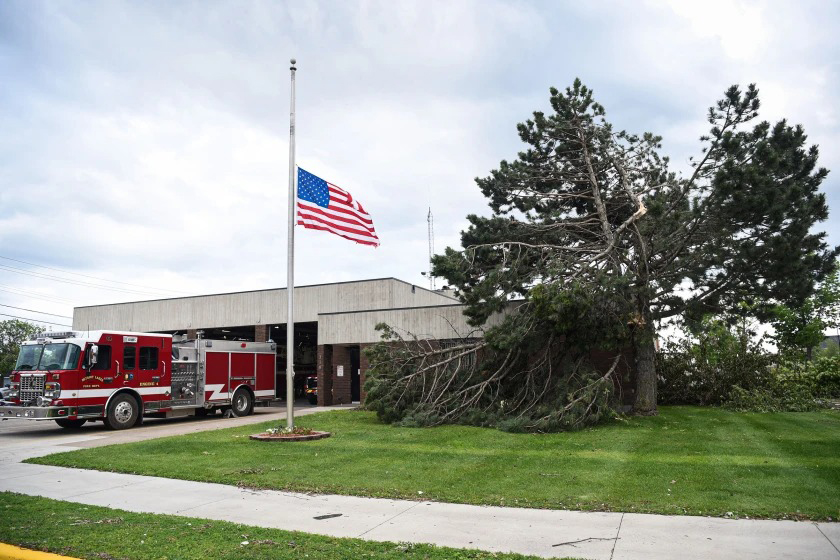President Donald Trump approved major disaster declarations for Alaska, Nebraska, North Dakota, and the Leech Lake Band of Ojibwe late Wednesday, while denying requests from Vermont, Illinois, and Maryland. Other states are still awaiting decisions.
The approvals and denials mostly followed party lines. Trump noted on social media that he had “won BIG” in Alaska in the last three presidential elections and expressed that it was his “honor” to deliver for the “incredible Patriots” of Missouri, a state he also won three times.
The disaster declarations authorize the Federal Emergency Management Agency (FEMA) to provide federal financial assistance to help repair public infrastructure damaged by disasters. In some cases, survivors may also receive funds for repairs and temporary housing.
Although Trump has approved more disaster declarations than he has denied this year, he has repeatedly suggested “phasing out” FEMA to encourage states to take more responsibility for disaster response and recovery. While states already lead disaster management efforts, they rely on federal assistance when their resources are insufficient.
An Associated Press analysis found that Trump has taken longer to approve disaster declaration requests than any previous administration.
**Approved Disaster Declarations**
– **Alaska** filed an expedited request after back-to-back storms this month wrecked coastal villages, displaced 2,000 residents, and killed at least one person. Trump approved a 100% cost share of disaster-related expenses for 90 days.
– **North Dakota** and **Nebraska** will receive public assistance for severe weather experienced in August.
– The **Leech Lake Band of Ojibwe** in northern Minnesota was approved for both public and individual assistance following a June storm that felled thousands of trees across its tribal lands.
**Denied Requests**
Trump denied four requests, including Maryland’s appeal for reconsideration after being denied a disaster declaration for severe May flooding affecting its two westernmost counties.
Governor Wes Moore, a Democrat, called the denial “deeply frustrating,” accusing the Trump Administration of politicizing disaster relief. Moore stated, “Our communities are the ones who will pay the price.”
Maryland has independently supported impacted individuals, deploying over $450,000 from its State Disaster Recovery Fund. Although Maryland met the preliminary damage assessment threshold for public assistance, Trump denied the July request. The state appealed in August with additional data showing $33.7 million in damage—more than three times the federal assistance threshold.
Vermont was also denied a major disaster declaration for July 10 floods after waiting over nine weeks for a decision. Eric Forand, Vermont’s emergency management director, said the damages to small towns “far exceed what they can afford on their own,” noting that repairs might cost over one or two years’ worth of annual budgets.
Other denials included Illinois’ request for individual assistance for three counties affected by July storms and flooding, and Alaska’s request to rebuild a public safety building destroyed in a July electrical fire.
White House spokesperson Abigail Jackson defended the decisions, stating, “President Trump provides a more thorough review of disaster declaration requests than any Administration has before him.” She added that Trump is “ensuring American tax dollars are used appropriately and efficiently by the states to supplement, not substitute, their obligation to respond to and recover from disasters.”
**Leech Lake Band’s Challenges**
Several states and tribes continue to wait for decisions. Lack of federal assistance can delay vital recovery projects, especially for smaller jurisdictions with tight budgets. Survivors may also be left without help to secure temporary housing or repair unsafe homes.
Before its approval, the Leech Lake Band of Ojibwe was financially strained, having spent about $1.5 million of its own funds to clear thousands of trees felled by a June thunderstorm. The tribe, which can apply for assistance independently of the state, had submitted its request nine weeks prior.
Beltrami County, the surrounding jurisdiction, did not meet the damage threshold to qualify for federal assistance, falling $800,000 short.
Duane Oothoudt, emergency operations manager for the Leech Lake Police Department, explained that the tribe had been “doing a lot of juggling, using reserve funding to operate and continue paying our contractors.”
Following the disaster declaration approval for both public and individual assistance, Oothoudt said his emergency management department would focus on helping survivors first. “There’s a lot of work to do,” he said. “People were hurt by the storm.”
https://www.twincities.com/2025/10/23/leech-lake-band-of-ojibwe-wins-federal-relief-for-june-storm-cleanup/
